Books by Gregory R. Piché, J.D.
The Four Trials of Henry Ford (scheduled for release October 2019)
Click here and Preorder Now!
Henry Ford—oracular genius, people’s hero, or narcissistic, autocratic bully? Four landmark court cases reveal the dark side of Ford’s legal clashes and the quirks of his character and personality that ushered his image in the public’s imagination from mechanical savant and populist sage to isolated, imperious bigot. Please enjoy these excerpts from The Four Trials of Henry Ford:
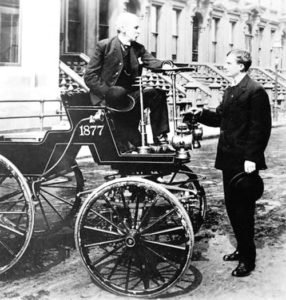 TRIAL 1: Columbia Motor Car Company and George B. Selden vs. C.A. Duer, Ford Motor Company, et al.
TRIAL 1: Columbia Motor Car Company and George B. Selden vs. C.A. Duer, Ford Motor Company, et al.
Henry Ford and his shareholders, as owners of a rising automaker, the Ford Motor Company, stood alone against a powerful auto syndicate, which claimed the right to dictate the industry by virtue of a patent on the automobile issued by the U.S. patent office to George B. Selden. When most other manufacturers were knuckling under and agreeing to pay tribute, he and his shareholders told the syndicate to “Go to hell” and marshaled a nine -year defense against the syndicate’s claim of patent infringement.
The Ford Motor Company’s ultimate victory on appeal, in the U.S. Court of appeals riddled the potency of the Selden patent, freeing up Ford’s own path to success, while mining a mother lode of favorable public opinion. Many Americans distrusted the way big business dominated the economy. Ford, reveling in the role of a progressive giant killer, later became an illustrious exemplar of industrial autocracy himself.
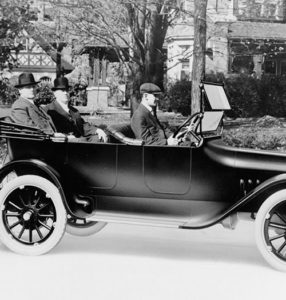 TRIAL 2: Dodge vs. The Ford Motor Company
TRIAL 2: Dodge vs. The Ford Motor Company
John and Horace Dodge, the famed Dodge Brothers, manufactured close to 70% of Ford Motor Company auto parts and 10% of Ford Company stock. In the early days the Dodge Brothers had 300 employees producing Ford auto parts while the Ford Motor Company only had 12. The brothers dragged Henry Ford to court over his oppression of minority shareholders and his pursuit of crackpot economic theories that spent their shareholder returns in service of Ford’s grandiose, autocratic dreams.
The Dodge Brothers, not prone to dismissive treatment, fought like hell in the courtroom. Their suit sought and largely achieved management accountability to shareholders, but also forced Henry Ford to buy out the minority shareholders to deliver to Henry Ford his dream—to gain full, autocratic control of the Ford Motor Company, without the necessity of kowtowing to pesky shareholders.
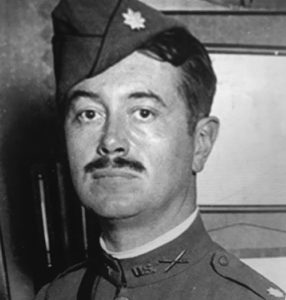 TRIAL 3: Henry Ford vs. The Chicago Tribune
TRIAL 3: Henry Ford vs. The Chicago Tribune
In 1916, Henry Ford’s noisy, isolationist political views prompted the Chicago Tribune to call Ford an “anarchist” and an “ignorant idealist.” Ford’s legal team swung into gear. The libel trial of the century was on. With minions to express his views for him in the press, Ford sounded lucid and eloquent. But on the witness stand, “Ole Henry” took more dramatic torpedo hits than the Lusitania. Ill-educated, shy, and inarticulate, Ford showed near-total ignorance of American history and refused to read the simplest paragraph aloud in the courtroom, leading to the suggestion that he could not read.
The auto giant, in a summer-long trial, did more harm to his public image and personal reputation than any offending newspaper editorial could. Despite his court travails, splashed across worldwide newsfeeds, Ford remained popular with his rural base. Personally humiliated, he swore that he would never again appear on the witness stand.
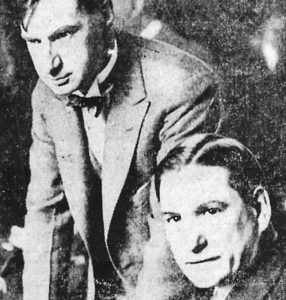 TRIAL 4: Sapiro vs. The Dearborn Publishing
TRIAL 4: Sapiro vs. The Dearborn Publishing
Ford threw himself unofficially into a bid for the American Presidency in 1924. He developed his own brand of rural right-wing populism, rife with anti-immigrant messages, without a mass movement political organization; he let “the news” be his rallying point. Ford’s newspaper, The Dearborn Independent, created its news—much like populist news organizations today. The Independent fired round after round of anti-Semitic attacks, including a manufactured international Jewish conspiracy to enslave Gentiles and achieve world domination. Then, Ford’s attacks grew personal; The Independent singled out one Jewish lawyer, Aaron Sapiro, and battered him with false accusations for nearly two years.
Sapiro fought back in a libel trial to vindicate both himself and his race. Ford, unsuccessful in dodging a subpoena to testify in the trial, faked an automobile accident and orchestrated a mistrial to keep from appearing on the stand. Sapiro gained a modest settlement, and Ford apologized publicly to the Jewish community. But Ford’s anti-Semitic publication (the counterfeit Protocols of the Elders of Zion) jumped the Atlantic Ocean. Its seeds of hate scattered across Europe and put down roots. Ford’s narcissism helped unleash the ravening dogs of the Holocaust.
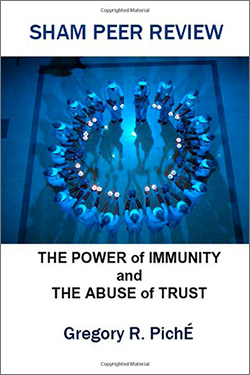 Sham Peer Review: The Power of Immunity and The Abuse of Trust
Sham Peer Review: The Power of Immunity and The Abuse of Trust
In attorney and medical advocate Gregory R. Piché’s hard-hitting book Sham Peer Review: The Power of Immunity and The Abuse of Trust, the author highlights several cautionary legal cases stemming from the Peer Review process, more appropriately known amongst medical professionals as the Sham Peer Review. Sham Pier Review is an illuminating read highlighting professional medical careers held in the balance from unjust and unfair evaluations of personal performance.
The book also delves into our judicial system’s fragile unwillingness and maze of interpretations in confronting and challenging the hornet’s nest created by Sham Peer Review’s. Every hospital as an institution has a power structure among its medical staff. Powerful members of a medical staff are never the subject of Sham Peer Review and rarely the subject of any kind of meaningful Peer Review. Armed with control over the Peer Review process, statutory immunity and other protections, medical staff leaders wield an immense amount of personal power over those on the medical staff that they view as threats, competitors, or of a lesser station.
